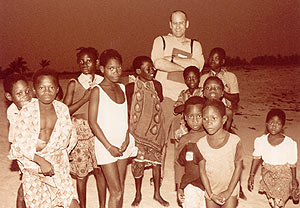 |
 |
 |
|
|||
|
In our ever-expanding global community, it's no surprise that more and more people are traversing continents and crossing oceans with the sole purpose of tasting local delicacies in far-off locales. Our contributor Matt Holzman recently traveled to the far reaches of Ghana to try and discover what is it about a pounded glob of starch called 'Fufu' that seems to pull the heartstrings of a nation. Holzman gets his Fufu, but finds it all a little hard to swallow... Bon Appetit! The
Mystery of Fufu By Matt Holzman, 5/31/2002 In LA, you can find Korean pine nut porridge and Peruvian skewered beef hearts in the same mini-mall. But, you just can't find a good bowl of Fufu, according to my friend Rocky who's from Ghana. Fufu is a quintessentially West African food, and one of Rocky's favorite topics. Rocky: You know, the whole thing is that Fufu is a state of mind. What I'm saying is, that to really explain why people love Fufu, you know, it doesn't, it's not a logical explanation. You know, you can't really explain. When you get to eat Fufu, how it's eaten, you know what I mean. That's how it is and I don't know why. I just know it tastes good. Rocky can go on and on about Fufu, but he never really says exactly what it is. But from what I gathered, Fufu's like a big rubbery African matzo ball. This was something I had to see for myself. So when I traveled to Ghana, I just had to try that voodoo that Fufu does so well. Rocky and his brother Bob pick me up at the airport in Accra. I figured we'd stop at the local drive-through and pick up a Fufu combo on the way home. But there aren't any fast food places in Ghana, mostly because Ghanaian food's just not all that fast. So we head off to the market to get everything we'd need to make Fufu ourselves. Actually, you don't really go to the market in Ghana, it just appears around you as you drive down the street. There's no sign, or parking lot, or shopping carts; you know you're there when the car's stuck in a crowd of women with baskets of produce on their heads and babies strapped to their backs. Vendors sell everything from spices to dried fish to squawking chickens, to things I've never seen before. But the best seller in all the market has got to be cassava, which are displayed in neat piles up and down the street. Cassava are the main ingredient in Fufu, and they look like yams on steroids. Bob negotiates for three or four big ones and a small bunch of plantain. Fufu's traditionally served in soup. The soup we're making will be made of palm nuts, the date-sized red and orange fruit of the oil palm tree. You see them hanging in bunches from trees all over, but since we'd left our machetes at home, we had to buy them. Bob gets enough to fill two old Folger's cans. Before we leave the market, we wind our way through a maze of rickety wood stalls to buy the last ingredients for the soup: spices you never heard of, and the world's hottest peppers. Bob: I think it's time we escaped from here! When we get back to the house, Bob drags out the old African Cuisinart -- a bucket-sized mortar and six-foot pestle, each carved from single pieces of wood. We wrestle the bark-like skin off the cassava and hack the hard white flesh into chunks. Then, we throw it in boiling water along with the plantain. A half-hour later, our friend Baba drains the cassava and plantain and starts pounding it in the mortar. While Baba pounds, Bob repeatedly sticks his hands into the mortar between strikes to fold the steaming mixture into itself. I keep thinking that I'm about to see a horrible accident, but Baba's song keeps a rhythm and the Fufu starts to come together. Finally, after about an hour of pounding and folding, and folding and pounding, Baba stops. It gets blissfully quiet. I look into the depths of the mortar to see what I've come all this way to see. There, at the bottom, is a shiny white orb the size of a basketball. It just looks like bread dough, and I think to myself, "So, this is Fufu?" The moment the Fufu hits the table, a crowd of Rocky's friends appear. His wife Cary serves us each a bowl of peanut butter-colored palm nut soup. Each bowl has a fist-sized ball of Fufu sitting in the middle. But she doesn't give us spoons or forks. It seems there are two important details that Rocky forgot to mention about Fufu: first, you eat it with your hands; second, and this is really the hard part, you don't chew. For my money, Fufu is a bit hard to swallow -- pun intended. It's slimy and rubbery, and pretty much tasteless. After three or four attempts at choking it down, I just give up. But when I look around the room at Rocky and his family and friends eating and laughing, covered in palm nut soup, I begin to realize what he was trying to tell me about Fufu. I thought he was talking about a kind of food, but it turns out he was describing a way of life. Fufu is only part cassava; it's main ingredients are custom, community, and the comfort of home. You see, when a Ghanaian like Rocky says Fufu is a state of mind, the state he's referring to is Ghana. In Accra, I'm Matt Holzman for The Savvy Traveler.
|
|
Search
Savvy Traveler
|
|
